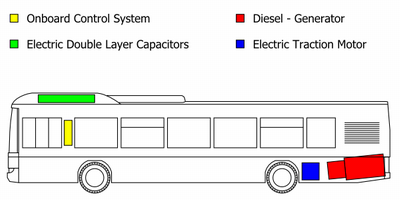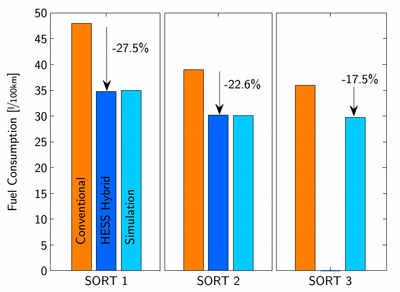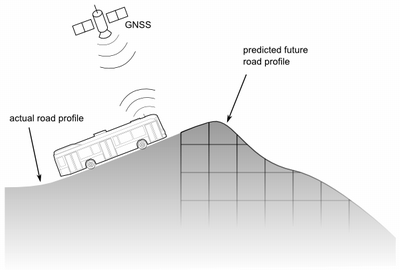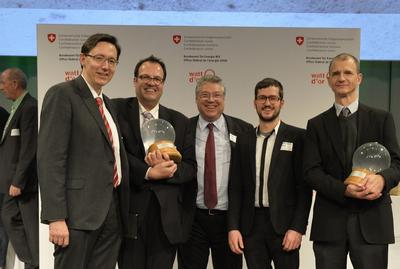AHEAD
This project aimed at optimizing the powertrain of a serial hybrid electric bus for public transportation. First the optimal sizing of the powertrain components (sizes of combustion engine, supercapcitor, traction motor, etc) were found using optimal control theory. Then an optimal energy management was implemented on the vehicle. Using the standardized on-road test procedure it was shown that the serial hybrid electric bus consumes up to 27.5% less fuel than a comparable diesel bus. Running on a real busline for 3 weeks, the serial hybrid bus consumed 20-25% less than a comparable diesel bus.
The main final results of this project have been published in the external page MTZ - Motorentechnische Zeitschrift Deutschland in external page German as well as in external page English language.
This project was awarded the external page Watt'dOr-Prize in the category "energy efficient mobility" in 2015.
The AHEAD project was a cooperation of external page HESS AG (Bellach, Solothurn) and ETH Zürich, sponsored by external page KTI and external page BFE.
Currently, HESS AG and IDSC are collaborating with external page VBZ in the field of Trolley-Bus-Systems in the SwissTrolley+ Project.
Hardware of a serial hybrid powertrain
The bus is propelled by an electric traction motor (see figure below). Electric energy is delivered by an engine-generator set in the back of the vehicle. During downhill driving and braking maneuvers, the traction motors regenerate kinetic and potential energy, which is then stored in the electric double-layer capacitors (EDLCs) on the roof of the bus. This "recuperated" energy can be used for propulsion later on.

Components have to fit vehicle and mission
The components of the powertrain have to be adjusted to the primary use of the bus. If for example the route is a flat and straight road without many stops the components will be very different from the case where the bus is driven in a hilly city. This project develops methods and tools to find the optimal design for a vehicle's primary use.
Optimal energy management needed
During operation, the vehicle requires an energy management controller that decides upon the power split, i.e., how the traction power to be delivered is split up between the diesel generator set and the superacapacitors. A good energy management controller is crucial for good fuel economy. In this project, a fuel-optimal energy management controller was developed and implemented on the vehicle. Using the standardized on-road test procedure, it was shown that the serial hybrid electric bus together with the fuel-optimal energy management reduces consumption by 17.5-27.5% compared to a conventional diesel bus.

Information about future elevation profile allows saving energy
Nowadays, almost every city bus is equipped with a GPS receiver that allows to detect the position of the bus on the busline. Together with a map of the busline stored on-board, the system can provide specific data to the energy management system. This way, the supercaps can be discharged prior to long descend and recuperation energy that otherwise would have been lost can be used to recharge the supercapacitors. This way, the system is more robust to altitude variations on buslines.

Project goals
In public transportation, where buses run only on very few routes, the design of the vehicle can be specialized and optimized. This project seeks
- to find the fuel-optimal component sizes for a given vehicle on a given route;
to implement a fuel-optimal, predictive energy management strategy that takes into account the future elevation profile.
Practical outcomes
HESS benefits from
- reduced time and cost for development and design;
- the possibility to demonstrate and compare the performance of powertrain designs.
The costumer of a HESS bus benefits from
- 20-25% reduced CO2 emissions;
- 20-25% reduced fuel cost.
Scientific research topics
Hybrid electric vehicle design and optimization and predictive control of hybrid electric vehicles.
Final Results
Elbert P., Widmer M., Gisler H.-J., Onder C., "Systematic Optimization of a Serial Hybrid Electric Bus", 2016, MTZ - Motorentechnische Zeitschrift Deutschland, Vol. 77, No. 5, pp. 62-67, Read Article in external page English or external page German.
Peer Reviewed Journals
Elbert P., Widmer M., Gisler H.-J., Onder C., "Stochastic dynamic programming for the energy management of a serial hybrid electric bus," 2015, International Journal of Vehicle Design, Vol. 69 No. 1/2/3/4 pp. 88-112. external page Read Article
Elbert P., Nüesch T., Ritter A., Murgovski N., Guzzella L., "Engine On/Off Control for the Energy Management of a Hybrid Electric Bus via Convex Optimization," 2013 IEEE Transactions on Vehicular Technology, Vol 63, No. 8, pp. 3549-3559. external page Read Article
Elbert P., Ebbesen S., Guzzella L., "Implementation of Dynamic Programming for n-Dimensional Optimal Control Problems with Final State Constraints," 2012, IEEE Transactions on Control Systems Technology, Vol 21, No. 3, pp. 924-931. external page Read Article
Ebbesen S., Elbert P., Guzzella L., "Battery State-of-Health Perceptive Energy Management for Hybrid Electric Vehicles," 2012, IEEE Transactions on Vehicular Technology, Vol. 61, No. 7, pp. 2893-2900. external page Read Article
Ebbesen S., Elbert P., Guzzella L., "Engine Downsizing and Electric Hybridization Under Consideration of Cost and Drivability," 2012, Oil & Gas Science and Technology – Rev. IFP Energies nouvelles, Vol. 68, No. 1, pp. 109-116. external page Read Article
Nüesch T., Flankl M., Elbert P., Onder, C., Guzzella L., "Convex Optimization for the Energy Management of HEVs Considering Engine Start and Gearshift Costs," 2013, Energies, Vol. 7, No. 2, pp. 834-856. external page Read Article
Peer Reviewed Conferences
Elbert P., Onder C., Gisler H.-J., "Capacitors vs. Batteries in a Serial Hybrid Electric Bus," 2010, IFAC Symposium Advances in Automotive Control, AAC 2010, Munich, Germany.
Elbert P., Ebbesen S., Guzzella L., "Economic Viability of Battery Load-Leveling in Hybrid Electric Vehicles using Supercapacitors," 2011, Int. Scientific Conference on Hybrid Electric Vehicles, RHEVE 2011, Rueil-Malmaison, France
Ebbesen S., Elbert P., Guzzella L., "Engine Downsizing and Electric Hybridization Under Consideration of Cost and Drivability," 2011, Int. Scientific Conference on Hybrid Electric Vehicles, RHEVE 2011, Rueil-Malmaison, France
Gisler H.-J., Elbert P., "Capacitors vs. Batteries in a Serial Hybrid Electric Bus," 2012, 9th Symposium on Hybrid- and Electric Vehicles, IAV 2012, Braunschweig, Germany

We've won the external page Watt d'Or prize in the category "energy efficient mobililty"!
2015
external page Watt d'Or: external page Photos, Interviews: external page Philipp, external page Christopher and external page Hans-Jörg, and the Energeia special issue.
2011
external page European Satellite Navigation Competition: external page Photos, Brochure.
2010
Hans Eggenberger award: ETH-Life article.
09.01.2015
external page Energeia plus blog summarizes the Watt d'Or award ceremony.
08.01.2015
ETH Life, external page Solothurner Zeitung and external page Soaktuell report about HESS and IDSC winning the Watt d'Or award.
08.01.2015
external page Energeia explain in their special issue for external page Watt d'Or how IDSC helps HESS to save energy. Download Read article. (PDF, 827 KB)
01.03.2014
external page Energeia explain in their external page latest issue how IDSC helps HESS to save energy. Download Read article. (PDF, 644 KB)
01.01.2014
The external page Omnibusspiegel explains the concept of the HESS-Voith Hybrid bus. Download Read article. (PDF, 1.6 MB)
27.11.2013
The external page Heidenheimer Zeitung explain the concept of the HESS-Voith Hybrid bus. Download Read article. (PDF, 453 KB)
21.10.2011
Congratulations! AHEAD was awarded the Download second prize (PDF, 417 KB) and external page Regional Winner of Switzerland in the European Satellite Navigation Competition external page ESNC.
21.06.2011
ETH GLOBE explain in their Download latest issue (PDF, 8 MB) how IDSC helps HESS to save energy. Download Read article. (PDF, 483 KB)
21.01.2011
ETH Life reports on Philipp Elbert winning the Hans-Eggenberger Prize for his Masterthesis.
01.01.2011
Congratulations! Philipp Elbert's Masterthesis "Optimal Component Design for Serial Hybrid Electric Buses" was awarded the external page Hans Eggenberger Prize.
01.10.2007
external page Stadtbus.de Onlinemagazin
This project is a cooperation with external page HESS AG.
It is sponsored by external page KTI.
08.01.2015
Watt d'Or 2015 Interviews:
external page Philipp Elbert
external page Christopher Onder
external page Hans-Jörg Gisler
09.09.2011
external page AHEAD Project Impressions
14.04.2009
external page Vossloh-Kiepe explain their Hybrid Technology used in HESS's lighTram Hybrid
29.05.2008
external page A test drive in HESS's lighTram Hybrid